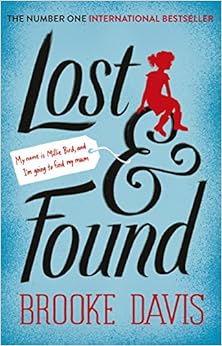Seven-year-old Millie Bird knows all about death - too much for one so young. Her book of dead things already has twenty-seven entries, ranging from her family pet dog to a spider. Number twenty-eight is the biggest one of all, but when her Mum takes her to a local department store and leaves her in the ginormous women's underwear section, Millie experiences a new sort of loss.
What would you do? In true seven-year-old spirit, Millie turns her new circumstances into a series of lonely games, conducting a funeral for a fly, trying out the cosmetics in the beauty department and partying with a mannequin. She befriends an old man called Karl, a former touch typist who has his own losses to bear.The rest of the time, she's watching out for Mum's gold shoes from beneath the rail of underwear with the sign she's made, In Here Mum, fixed above.
Eventually Millie and her red wellies are found, but not in the way she hopes. It's what happens next, when Millie and Karl team up with eighty-two-year-old Agatha Pantha, who hasn't left home in the years since her husband died, which turns the narrative into an unlikely sort of road trip with both funny and devastating consequences.
At first Lost and Found reminded me of Catherine O'Flynn's similarly titled What Was Lost, whose young heroine Kate is subsumed by the world of a late twentieth century shopping centre. Its central theme also calls to mind the Norwegian writer Tarjei Vesaas' creation in The Ice Palace of a childish existence much closer than an adult's to the forces of nature, the creative tensions of life and death. Yet Davis's writing is also engagingly original, as she takes the reader right into Millie's head:
Sometimes, when Millie takes her gumboots for a walk through the park near her house...she makes Walking Poems. She hears two words from the muscly couple running side by side (He said) and three words from the mum talking to her baby in the pram (want your dummy?) and a word from the elderly couple holding hands like they're holding each other up (specifically) and then the silence from the girl not wearing much at all (...) but her sunglasses are the biggest thing on her body and she has music shoved in her ears and she's concentrating on moving the fat on her thighs to her boobs and the expression on her face, that concentration, is part of the poem too
He said
Want your dummy?
specifically
...At the other end of the age spectrum Davis humorously captures Karl's view of his nursing home:
A woman sat in an armchair doing her knitting, which was a reasonable and comforting-enough scenario had she been one of those soft, rounded women with pink cheeks, a gaggle of grandchildren at her feet to knit for, a sparkle in her eye, some scones in the oven. But she seemed to Karl to be knitting her own umbilical cord to the living; knitting so she wouldn't die.and Agatha Pantha's paralysis after the death of her husband:
...neighbours suddenly dropped by unannounced, appearing on her doorstep from behind huge, hulking casseroles full of dead animals, and pity...They talked with their faces only centimeters away from hers. I understand, they all said, because Susie/Fido/Henry died last year/last week/ten years ago because she/it/he had lung cancer/was hit by a car/wasn't really dead but was dead to her because he was living with a twenty-six-year old on the Gold Coast.If at first I felt a little unsure about the direction of Lost and Found and whether Millie, Karl and Agatha would really make such an impromptu dash across Australia to find Millie's mum, I ended by being absorbed in the captivating simplicity of Davis's writing, her quirky humour and the novel's overarching ache of grief. By how those who are left behind can stop living because their loss is so overwhelming. And by how this motley crew of brave, offbeat characters find renewed hope in each other and rediscover the strength to carry on.
At the end of the book, most moving of all, is Davis' article 'Relearning the World' about the death of her own mother in a car crash and how she eventually began to find a way to live alongside her grief. The article made me want to go back and reread Lost and Found in a new light. Brooke Davis, like her characters, is discovering her own way back and the praise she has received for her courageous novel is well deserved.
Lost & Found is published in the UK by Hutchinson, many thanks to them for my review copy.


No comments:
Post a Comment
I'd love to hear what you think! Please let me know in the box below